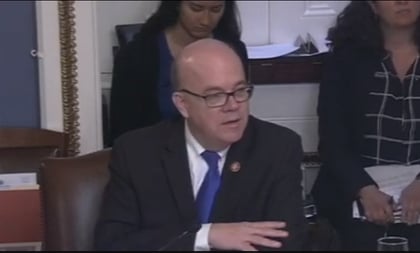The House Rules Committee met Tuesday for the first congressional hearing ever on a Medicare for All bill — H.R. 1384, the Medicare for All Act of 2019 bill.
If passed and implemented as written, the bill would eliminate private health insurance, health insurance cost-sharing, long-term care insurance, dental insurance and vision insurance in the United States.
(Related: We Can Handle Medicare for All: Aflac)
Witnesses at the hearing spent much of their time talking about the impact of high health care costs on people’s lives.
Some of the witnesses talked about why shifting to a Medicare for All system might be more complicated than it sounds.
40% Provider Pay Cuts
Charles Blahous, a policy analyst who has served as an economics advisor to former President George W. Bush and other Republican leaders, talked about how a Medicare for All system might be financed, and how much it might really cost.
The United States now spends about $3.8 trillion per year on health care, and it could spend about $45 trillion on care, other than nursing home care, over the 10-year period from 2018 through 2027, according to national health expenditures estimates from the Medicare Office of the Actuary.
Blahous says in his written testimony that, when he analyzed a 2018 Medicare for All bill that excluded coverage for nursing home care, he found that it could cost at least $32.6 trillion over the 10-year period from 2022 through 2031.
But the 10-year costs could be that low only if all health care providers accepted Medicare for reimbursement rates for all patients, Blahous says.
Traditional Medicare now pays providers about 40% less than private insurers do, and Medicare payment rates appear to be substantially below what providers need to get to break even, Blahous says.
If a new national health care system kept the current rules for paying providers and drugs in place, the Medicare for All system would probably cost at least $38.8 trillion over 10 years, or about $6.2 trillion more than with all care provided at Medicare reimbursement rates, Blahous estimates.
Sara Collins, a health care coverage analyst at the Commonwealth Fund, an organization seen as sympathetic to the Affordable Care Act, says in her written testimony that requiring all providers to take Medicare rates for all care would also make the economics of health care systems other than a Medicare for All system look better.
If, for example, all providers who treated patients with Affordable Care Act exchange plan coverage received Medicare-level payment rates, that could cut federal spending on ACA premium tax credit subsidies by $11.8 billion in 2020, and that could cut the enrollees’ own spending on ACA exchange coverage premiums by $1.7 billion, Collins estimates.
The federal government spent about $55 billion on ACA premium tax credits in 2018, according to analysts at the Henry J. Kaiser Family Foundation.
“Paying providers in commercial insurance plans at prices closer to those in Medicare or allowing the secretary of Health and Human Services to negotiate prescription drug prices have potential to slow health care cost growth and would not require an immediate shift to a single-payer system,” Collins says.
Collins says that some Medicare for All proposals include transitional period provisions that would add some policy changes, such as new restrictions on provider pay, but are less sweeping than shifting to a completely government-run health care finance system.









 May 01, 2019 at 01:41 PM
May 01, 2019 at 01:41 PM











